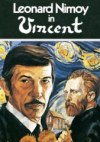Lust for Life (d. Vincente Minnelli, 1956): A classic. I don't think that Kirk Douglas captures Van Gogh's character quite as well as Tim Roth does (and I know that a lot of people would disagree with me on that), but the film is still excellent. The art and set direction are absolutely outstanding--you'll be watching a very intense moment, the camera will slowly pull back and then bang you see that you're looking at an incredible, full-scale reproduction of The Night Cafe in the Place Lamartine in Arles.
 Vincent (d. Leonard Nimoy, 1981): Leonard Nimoy directs and stars in the famous one-man play based on Nimoy's adaptation of "Van Gogh" (1979) by Phillip Stephens. In the play a week has passed since Vincent's death by suicide and his brother, Theo (played by Nimoy), has grappled with his emotions to finally find the proper words to say at Vincent's funeral. Nimoy's performance has been called a tour-de-force as he explores the artist through poignant commentary, frequently relying on Vincent's own letters. This play is often heart-wrenching and yet occasionally delivers surprising comic elements (for example, when Vincent, in a letter, describes his relationship to Sien, a prostitute in The Hague). Nimoy's acting is wonderful and the play remains a powerful exploration of Van Gogh's genius as an artist, and of the great love and sorrow shared by the two brothers.
Vincent (d. Leonard Nimoy, 1981): Leonard Nimoy directs and stars in the famous one-man play based on Nimoy's adaptation of "Van Gogh" (1979) by Phillip Stephens. In the play a week has passed since Vincent's death by suicide and his brother, Theo (played by Nimoy), has grappled with his emotions to finally find the proper words to say at Vincent's funeral. Nimoy's performance has been called a tour-de-force as he explores the artist through poignant commentary, frequently relying on Vincent's own letters. This play is often heart-wrenching and yet occasionally delivers surprising comic elements (for example, when Vincent, in a letter, describes his relationship to Sien, a prostitute in The Hague). Nimoy's acting is wonderful and the play remains a powerful exploration of Van Gogh's genius as an artist, and of the great love and sorrow shared by the two brothers.
Van Gogh (d. Maurice Pialat, 1992): This French film focuses specifically on the last 67 days of Van Gogh's life. I bought this film a number of months ago and finally got around to watching it. All I can say is that it was not worth the wait. I was extremely disappointed with Pialat's portrayal of Van Gogh (played by Jacques Dutronc). The potential was there--Van Gogh's story is so rich that the idea of focusing on one brief portion of his life is a good one, but we would hope that the focus would be in the right place. This Vincent is nothing like we would expect--cold, selfish, a womanizer, he held contempt for both Theo as well as his own works. There may very well be facets of each of these qualities which are true, but more to the point there were two aspects which were of most disappointment to me: the decision to focus on supposition rather than fact (much of the film is centred around Van Gogh's affair with Marguerite Gachet, which is very likely pure fiction), and slow pacing and poor editing (two and a half hours, but only because we get long, drawn out scenes of people dancing in cabarets or lounging around by the riverside discussing nothing). Where is Vincent in all of this? Altogether, the film probably deals with Vincent and his art for about twenty minutes. The film misses so much: the true Vincent, his work, his relationship with Theo. Even the death scene is bungled: it's cold, boring and concludes with Vincent's final words (where did they get this from?) "I'm hungry". I was hungry, too, as the credits rolled. Hungry to see a film in which Vincent's life and art was properly explored, rather than a drawn out and pointless waste of time.
Akira Kurasawa's Dreams (d. Akira Kurasawa, 1990): While not specifically about Vincent van Gogh, this film by veteran Japanese filmmaker Akira Kurasawa features several different dream-like sequences, including one about Van Gogh. In the segment entitled "Crows", we see a young Japanese art student actually enter into one of Vincent's paintings in order to speak with the painter he admires so much. The results are surprising and wonderful. The segment is short but powerful and the includes a wonderful scene in which the young Van Gogh enthusiast pursues Vincent through one painting after another. The result is astounding, thanks in part to the folks responsible for the special effects--none other than George Lucas's Industrial Light and Magic team.




 Return to Van Gogh References page
Return to Van Gogh References page Return to main Van Gogh Gallery page
Return to main Van Gogh Gallery page